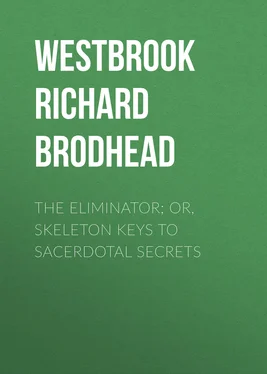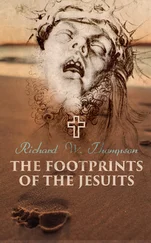Richard Westbrook - The Eliminator; or, Skeleton Keys to Sacerdotal Secrets
Здесь есть возможность читать онлайн «Richard Westbrook - The Eliminator; or, Skeleton Keys to Sacerdotal Secrets» — ознакомительный отрывок электронной книги совершенно бесплатно, а после прочтения отрывка купить полную версию. В некоторых случаях можно слушать аудио, скачать через торрент в формате fb2 и присутствует краткое содержание. Жанр: foreign_prose, foreign_religion, Философия, foreign_psychology, foreign_antique, на английском языке. Описание произведения, (предисловие) а так же отзывы посетителей доступны на портале библиотеки ЛибКат.
- Название:The Eliminator; or, Skeleton Keys to Sacerdotal Secrets
- Автор:
- Жанр:
- Год:неизвестен
- ISBN:нет данных
- Рейтинг книги:3 / 5. Голосов: 1
-
Избранное:Добавить в избранное
- Отзывы:
-
Ваша оценка:
- 60
- 1
- 2
- 3
- 4
- 5
The Eliminator; or, Skeleton Keys to Sacerdotal Secrets: краткое содержание, описание и аннотация
Предлагаем к чтению аннотацию, описание, краткое содержание или предисловие (зависит от того, что написал сам автор книги «The Eliminator; or, Skeleton Keys to Sacerdotal Secrets»). Если вы не нашли необходимую информацию о книге — напишите в комментариях, мы постараемся отыскать её.
The Eliminator; or, Skeleton Keys to Sacerdotal Secrets — читать онлайн ознакомительный отрывок
Ниже представлен текст книги, разбитый по страницам. Система сохранения места последней прочитанной страницы, позволяет с удобством читать онлайн бесплатно книгу «The Eliminator; or, Skeleton Keys to Sacerdotal Secrets», без необходимости каждый раз заново искать на чём Вы остановились. Поставьте закладку, и сможете в любой момент перейти на страницу, на которой закончили чтение.
Интервал:
Закладка:
The priestly office has always been deemed one of great influence, so that ancient kings were accustomed to assume it. This was true of the kings of ancient Egypt, and the practice was kept up among the Greeks and Romans. Even Constantine, the first Christian emperor (so called), continued to exercise the function of a pagan priest after his professed conversion to Christianity, and he was not initiated into the Christian Church by baptism until just before his death. One excommunicated king lay for three days and nights in the snow in the courtyard before the Pope would grant him an audience! The “Pontifex-Maximus” idea of the Roman emperors was the real foundation of the “temporal power” claimed by the bishops of Rome. Kingcraft and priestcraft have always been in close alliance. When the king was not a priest he always used the priest; and the priest has generally been willing to be used on the side of the king as against the people when liberally subsidized by the reigning potentate. Moreover, priestcraft has always been ambitious for power, and sometimes has been so influential as to make the monarch subservient to the monk. More than one proud crown has been humbly removed in token of submission to priestly authority, and powerful sovereigns have been obliged to submit to the most menial exactions and humiliations at ecclesiastical mandates. The priestly rôle has always been to utilize the religious sentiment for the subjection of the credulous to the arbitrary influence of the caste or order.
Priestcraft never could afford to have a conscience, so admitted, and therefore it has not shrunk from the commission of any crime that could augment its dominion. Its greatest success has been in the work of demoralization. It has always been the corrupter of religion. The ignorance and superstition of the people and the perversions of the religious sentiment, innate in man, have been the stock in trade of the craft in all ages, and are to-day.
It will be shown later how the whole system of dogmatic theology, Romish and Protestant (for the system is the same), has been formed so as to aggrandize the priest, perpetuate his power, and hold the masses in strict subjection. This is a simple matter of fact. History is philosophy teaching by example, and often repeats itself, and it seldom gives an example of a priestly caste or “holy” order of men leading in a great practical reform. The dominant priestly idea is to protect the interests of the order , not to promote the welfare of the people.
In view of these principles and facts, and others which might be presented, it is reasonable to conclude that we cannot expect the whole living, unadulterated truth, even if they had it, from the professional clergy. The caste idea renders it essentially unnatural and philosophically impossible.
But there are other potent reasons why such expectation is vain. All Christendom is covered with numerous sects in the form of ecclesiastical judicatories, each claiming to be the true exponent of all religious truth. The Romish Church is pre-eminently priestly and autocratic. The priesthood is the Church, and the people only belong to the Church; that is, belong to the priesthood, and that, too, in a stronger sense than at first seems to attach to the word belong . Then the priesthood itself is subdivided into castes.:
“Great fleas have little fleas upon their backs to bite ’em,
And little fleas have lesser fleas; and so—ad infinitum”
When Patrick J. Ryan was installed Archbishop in Philadelphia, an office conferred by a foreign potentate, our own city newspapers in flaming headlines called it “The Enthronement of a Priest!” And so it was. He sat upon a throne and received the honors of a prince. He is called “His Grace,” and wears the royal purple in the public streets. Bishops are higher than the “inferior clergy,” and the priest, presbyter, or elder is of a higher caste than the deacon, and all are higher and more holy than the people. All ministers exercise functions which would be deemed sacrilege in a layman. The same odious spirit of caste prevails in fact, if not so prominently in form, in all orthodox denominations, especially as to the distinction between the clergy and the laity. Even Quakers have higher seats for “recommended ministers.”
Moreover, priests have laid down creeds containing certain affirmations and denials which are called “Articles of Religion,” to which all students of divinity and candidates for holy orders must subscribe before they can be initiated into the sacred arcana.
The professor in the theological seminary, who perhaps was selected for the chair quite as much for his conservatism as for his learning, has taken a pledge, if not an oath, that he will teach the young aspirant for ecclesiastical honors nothing at variance with the standards of his denomination; which covenant he is very sure to keep (having other professors and aspirants for professorships to watch him) in full view of the penalty of dismission from his chair and consequent ecclesiastical degradation. The very last place on this earth where one might expect original research, thorough investigation, and fearless proclamation of the whole truth is in a theological school. A horse in a bark-mill becomes blind in consequence of going round and round in the same circular path; and the theological professor in his treadmill cannot fail to become purblind as regards all new truth.
What can be expected from the graduates of such seminaries?
The theological novitiate sits with trembling reverence at the feet of the venerable theological Gamaliel. From his sanctified lips he is to learn all wisdom. Without his approbation he cannot receive the coveted diploma. Without his recommendation he will not be likely to receive an early call to a desirable parish.
The student is obliged to find in the Bible just what his Church requires, and nothing more and nothing less. In order to be admitted into the clerical caste and have holy hands laid upon his youthful head he must believe or profess to believe, ipsissima verba , just what the “Confession” and “Catechism” contain. The Rev. Dr. Samuel Miller once said in a sort of confidential undertone, “What is the use of examining candidates for the ministry at all as to what they believe? The fact that they apply for admission shows that they intend to answer all questions as we expect them to answer; else, they very well know, we would not admit them.”
The ecclesiastical system is emphatically an iron-bedstead system. If a candidate is too long, it cuts him shorter; and if too short, it stretches him. He must be made to fit. Then, after “ordination” or “consecration,” the new-fledged theologian enters upon his public work so pressed by the cares of his charge and the social and professional demands upon his time that he finds it impossible to prepare a lecture and two original sermons a week; so he falls back upon the “notes” he took from the lips of his “old professor” in the divinity school, or upon some of those numerous “skeletons” and “sketches” of sermons expressly published for the “aid” of busy young ministers; and he gives to “his people” a dish of theological hash, if not of re-hash, instead of pouring out his own living words that should breathe and thoughts that should burn.
Hence it is easy to see why one scarcely ever gets a fresh, living truth from the pulpit. It is almost always the same old, old story of commonplace fossils that the wide-awake world has outgrown long ago, and that modern science has fearlessly consigned to the “bats and the moles” of the Dark Ages. No wonder the pulpit platitudes fail to attract the masses of earnest men, especially in our great cities.
Then if a clergyman should discover, after years of thought and study, that he has been in error in some matters, and that a pure rational interpretation of the Bible is possible, and he really feels that the creeds, as well as the Scriptures, need revising, what can he do? If he lets his new light shine, he will share the fate of Colenso, Robertson Smith, Augustus Blauvelt, Professor Woodrow, and scores of others. He knows that heresy-hunters are on the scent of his track. The mad-dog cry of Heretic would be as fatal as a sharp shot from the ecclesiastical rifle. Proscription, degradation, ostracism, stare him in the face. Few men who have the esprit de corps of ecclesiasticism and a reasonable regard for personal comfort and preferment are heroic enough to face the social exclusion, financial ruin, and beggary for themselves and families which are almost sure to follow a trial and condemnation for heresy. If the newly-enlightened minister escapes the inquisition of a heresy trial by declaring himself independent, he has a gauntlet to run in which many poisoned arrows will be sure to pierce his quivering spirit. It is true that some sects have no written creed and no trials for heresy; but even among them there is an implied standard of what is “regular,” and more than one grand soul knows by a sorrowful experience, what it is to belong to the “left wing” of the Liberal army, and to follow the “spirit of truth” outside of the implied creed.
Читать дальшеИнтервал:
Закладка:
Похожие книги на «The Eliminator; or, Skeleton Keys to Sacerdotal Secrets»
Представляем Вашему вниманию похожие книги на «The Eliminator; or, Skeleton Keys to Sacerdotal Secrets» списком для выбора. Мы отобрали схожую по названию и смыслу литературу в надежде предоставить читателям больше вариантов отыскать новые, интересные, ещё непрочитанные произведения.
Обсуждение, отзывы о книге «The Eliminator; or, Skeleton Keys to Sacerdotal Secrets» и просто собственные мнения читателей. Оставьте ваши комментарии, напишите, что Вы думаете о произведении, его смысле или главных героях. Укажите что конкретно понравилось, а что нет, и почему Вы так считаете.












